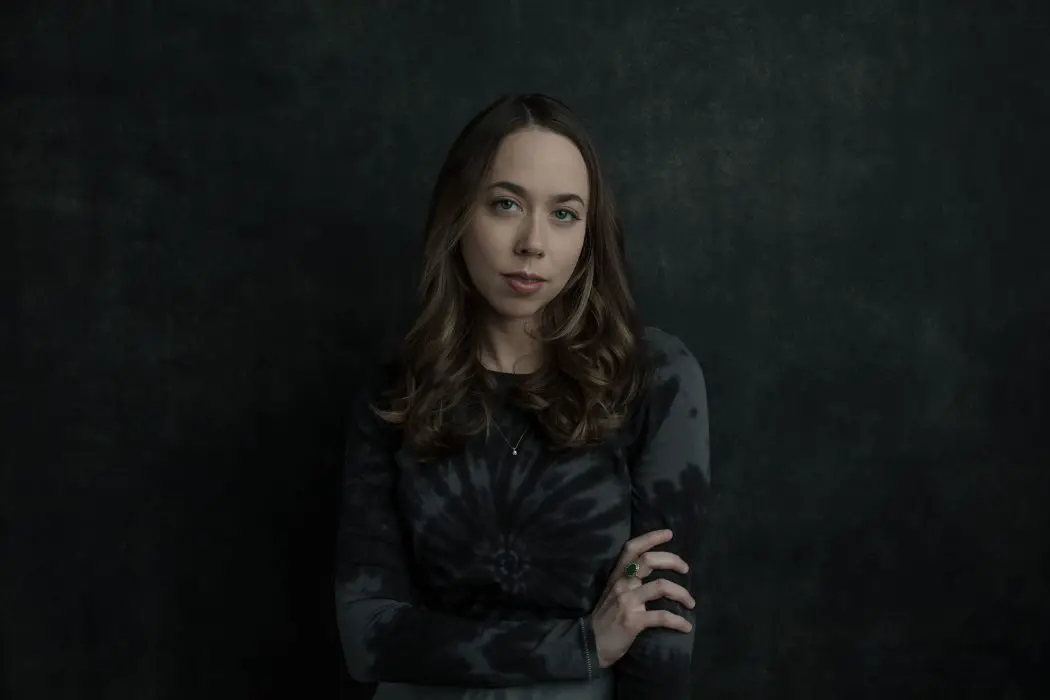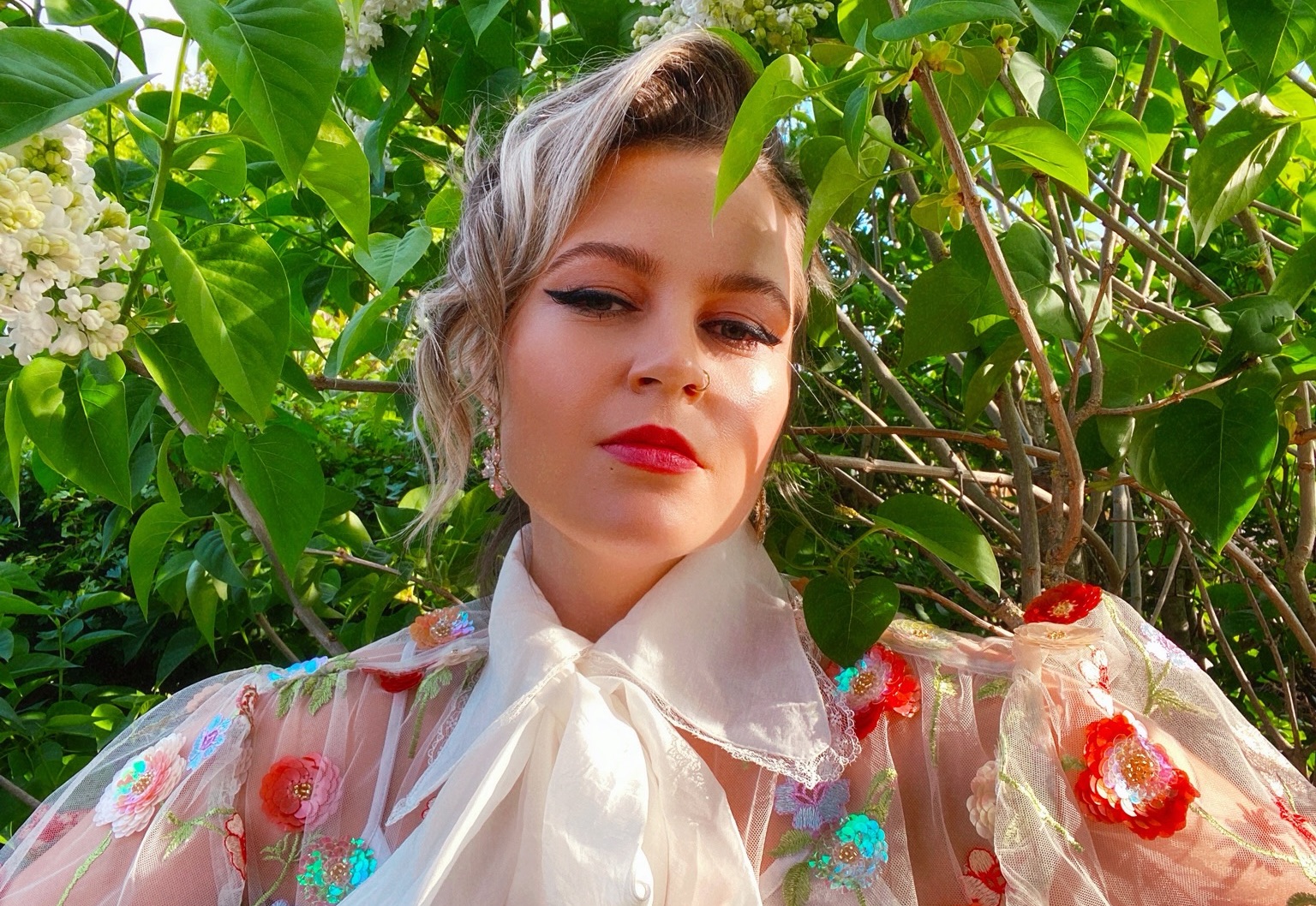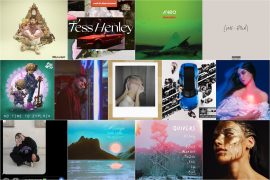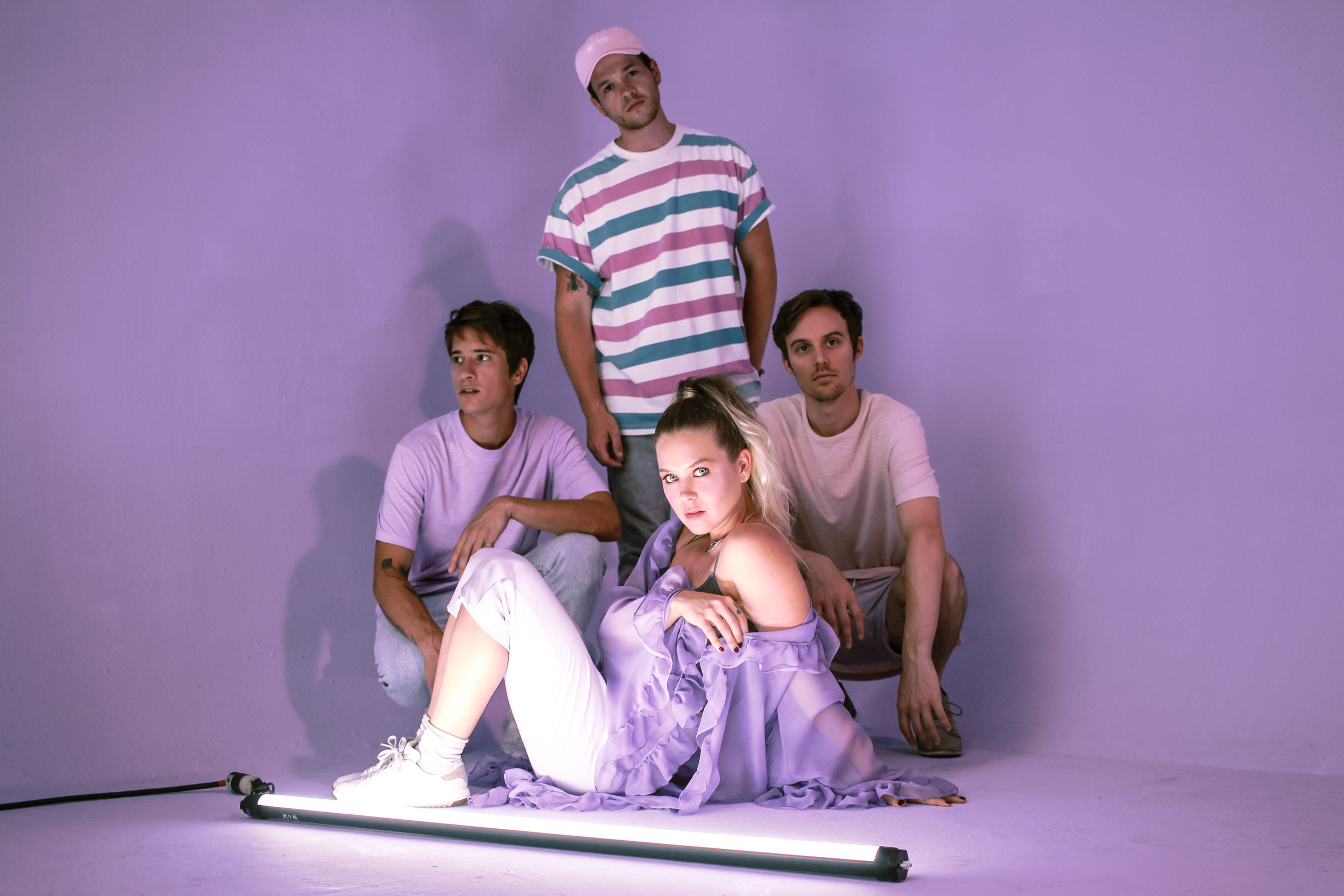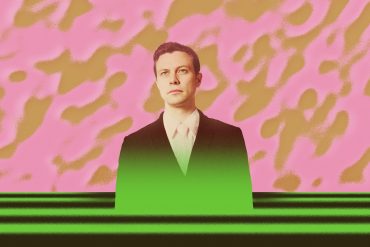Grammy winner and multi-instrumentalist Sarah Jarosz is back with another stunning album that’s part Americana, part country, part bluegrass, and all Jarosz.
— —
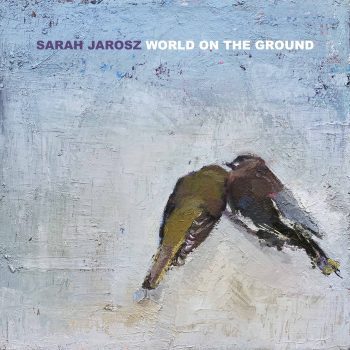
At 29, Sarah Jarosz has already had a decade-long career. Her first album, Song Up In Her Head, came out when she was 19, and her subsequent work has won Grammys and the attention of beloved Americana musicians. She collaborates frequently with mandolinist Chris Thile and his band Punch brothers, and she joined with Sara Watkins (of Nickel Creek) and Aoife O’Donovan (of Crooked Still) to form I’m With Her. Her newest record, World On the Ground (out June 5, 2020 via Rounder Records), is another shift in direction for the multi-instrumentalist – most notably, her first record with drums. She also worked with award-winning producer John Leventhal, who’s produced for Shawn Colvin, Michelle Branch, Loudon Wainwright, and more, to craft the sound.
It’s an album of stories, both micro and macro, and the characters play on moments from her childhood in Texas. In it are songs of standing still and the desire to move, of home and leaving it, all of it wrapped in mandolin, guitars, and indelible hooks. There is a certain brand of honesty to Jarosz’s writing that can be heard in the music of writers like Gillian Welch and Allison Kraus, and Jarosz has already proven herself to be on the way to becoming a name like them. Atwood Magazine spoke to the singer-songwriter about World On the Ground, collaboration, and seeking inspiration from the natural world.
Listen: ‘World on the Ground’ – Sarah Jarosz
A CONVERSATION WITH SARAH JAROSZ
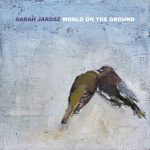
Atwood Magazine: There is a hush on this record and is more pronounced on your other albums. Was that intentional or did it just come out that way?
Sarah Jarosz: A little bit of both. I think in the past when I’ve made my records, I’ve gone into the studio being very set about how I wanted things to turn out, not really allowing room for a ton of discovery. This was my first time working with a different producer [John Leventhal] on one of my solo records, and I think because I was working with him and because it was my first time working with a producer who was also a musician, and I knew he was going to be playing on the record and he had expressed interest in writing together, I just felt like it was going to be better all around to go in being more open and with skeletons of the idea but not the full, fleshed out thing.
This actually was the first time that I’ve written one of my records with drums in mind. In the past I’ve been sort of anti-drum on my records, but I was really hearing them on these songs. I think “Eve” and “Johnny” were the first two that John and I started working on, and he would just go into the other room and lay down a simple drum track and it was pretty instantaneous. I was like, “That’s exactly how I’m hearing it in my head.”
How would you say it’s different to have a producer that's also a musician?
Sarah Jarosz: It’s funny because I’ve heard mixed opinions about it. I think sometimes, when a producer is a musician as well, it can be tricky in terms of not wanting the record to turn into their sound. But then sometimes you do, and that’s why you pick someone, you love the sound that they got on another band’s record or a record of their own. The records that John made with Shawn Colvin especially have been some of my favorite recorded music of all time, and so there was something about those tones and specifically the guitar tones that he captures that I felt would marry really well with my music. I still felt like there was so much room for me to be me within the record. He’s just a master producer in that sense. I felt very well-guided but also not trampled on. The biggest difference is, not that I haven’t had fun on my previous records, but I t found it very fun to sort of not go into the studio each day thinking of it technically, like, “Okay, I have the song written and now I have to go and stand behind the mic in the perfect position and record it.” It felt like we were just playing the songs in the room and the mics happened to be up and recording.
The genres you play in are also such community-based ones, and you in particular collaborate with so many people. How has your collaborative work, like with Sara Watkins and Aoife O’Donovan, affected your solo work?
Sarah Jarosz: It’s made me more open to collaboration. Honestly, early on in my records I had the ideas sort of fully fleshed out in my brain, which I think was good in terms of trying to carve out whatever my sound was early on, but along with that came being really closed off to cowriting for many years. The label management would always say like, “Why don’t we set up a co-writing session for you and get together with this person?” and for a long time the idea of that just felt kind of weird and forced to me. Songwriting, for me, was this sort of alone-in-my-room, solitary experience, and it was hard for me to imagine sharing that with someone else. I actually think Jedd Hughes, who played and co-wrote on Undercurrent, was a good gateway for me to have really positive experiences co-writing. And then obviously, from there, getting to be in a band with Sara and Aoife just totally broke open the idea of what it means to be a teammate and a collaborator. It made me want to carry on those experiences of collaboration and positivity on this record.

To me, at least, this record sounds like it leans a bit more country than your past records. Is that true?
Sarah Jarosz: I’m always hesitant to insert myself into a genre title because I don’t actually feel like I’ve been making “bluegrass” music since my first record. Even that was sort of a stretch from what I consider to be traditional bluegrass, which is the world that I grew up in. I grew up going to a weekly Friday night bluegrass jam and passing the songs around the circle, you know, your idea of what a traditional bluegrass sound is. Because I grew up in that scene, I think a lot of people from the beginning have wanted to still continue to label me as a bluegrass artist, but in terms of the actual songs that I write and the music that I create, I haven’t ever really felt like I write bluegrass music. What I was saying about being very anti-drum before, it’s funny how that one instrument can make something feel less rooted in bluegrass or American roots music or whatever you want to call it. I think maybe that’s that’s the major sonic change that would sort of make you feel that way, which I totally think is accurate. It definitely feels like a departure, in some sense, whether it’s from bluegrass to country I don’t know but, but I’m always trying to grow you know as an artist. And working with John expanded my sonic palette for sure.
The stories on this record feel so specific, which is what made me think of classic country. Do they tie together for you?
Sarah Jarosz: I think they’re tied together in the sense that they all feel rooted in the same place. When I’m singing them, I’m sort of picturing the same Hill Country landscape in my head so they feel tied together in that sense, but the actual stories from song to song almost feel more like vignettes. Now I’m getting what you were saying about the country thing. It’s funny, I almost feel like if there were a genre title for it, it’s almost like Texas singer songwriter. I think someone who comes to mind is Willie Nelson, who never really felt like he fit into the Nashville country world. Then he went to Texas and it was like he found himself and suddenly became the Willie Nelson you know. In my mind, that is sort of like real country music. I would say more than country, the Texas singer songwriter storytelling influence was huge for me on this record. I grew up being surrounded by so much of that music, but in the last couple of years I’ve sort of been rediscovering it on my own as an adult and developing such a deep appreciation for the lyrics and the stories. It really made me want to try to write in that way.
I know you grew up in Texas, and you’ve said that you didn’t feel you could’ve written these songs without having done the Blue Heron Suite for the FreshGrass Festival commission. The songs on World On the Ground aren’t inherently about your childhood, but do you think it’s in there regardless?
Sarah Jarosz: I think that really did open the gates, because that was really the first time I wrote about my hometown and my mom going through breast cancer and the Texas coastline. I was very influenced by a lot of Nanci Griffith tunes which referenced the Gulf Coast and that whole part of Texas. I think it’ll make more sense for fans – it’s funny that they’re now coming out in this opposite order, it would have probably made more chronological sense if they had come out in proper order. World On the Ground certainly was a kind of continuation of Blue Heron Suite, even the songs that aren’t about me – “Johnny and Eve” do feel like they’re about me in a way. I’m drawing on the images of my backyard and my childhood home so they’re not just completely made up stories, they’re rooted in reality for sure.

Are there other places that you find inspiration for your writing?
Sarah Jarosz: I do feel like as I’ve gotten older – I guess it started on Undercurrent – where I had this sense of landscape inspiring songs for me. Particularly, I started thinking about this idea that Daryl Scott, who is one of my favorite singers and musicians, was talking about in an interview about how if someone’s songs are good, you can almost hear the landscape of where they are from in their songs. With Undercurrent, that was the first time that I was trying to write from that place, whereas before a lot of the songs were from a very inward sort of writing. That was the first time that I was like, “Okay, what’s actually in front of me? The Jacqueline Kennedy Onassis Reservoir and Central Park,” and trying to be more of an observer in that sense.
“Jacqueline” [from Undercurrent] was maybe the first song that actually opened the doors for me in terms of being inspired by something that’s not an emotion, but rather a tangible thing in front of my face. The older I get, I’m more influenced by nature and trying to look more outside of myself which is important – especially now, being cooped up in the house, it’s just so easy to get inside your own head. I think it helps to keep your eyes open and look at what’s right in front of you, not necessarily what’s going on in your brain.
Much of this record seems to be about standing still and a desire for change. It all feels particularly prescient considering the current state of things. Two lyrics that really stuck out to me were “an open heart looks a lot like the wilderness” from “Johnny” and “I’m getting swallowed up by all my choices” from “Empty Square.”
Sarah Jarosz: Funny story about “Empty Square.” That was the last song that John and I wrote for the record. At the end of the record, you’re sort of still searching for inspiration and trying to change things up a little bit, and when we were recording and writing that, it was like at the height of Succession, the HBO show. I became completely obsessed with it while we were working on the record, and that song is actually written from the perspective of the character Kendall. The show is loosely based on the Murdochs and the power struggles within this very wealthy family. Because it was just so vividly written about Kendall Roy, I was like, “This song is so not me.” Now it’s funny when I listen to it, there’s an exposed sort of something going on there that I’m looking back at that I feel like I can relate to, especially with the unexpected nature of this year. That’s a fun backstory of that song that I haven’t actually talked about in interviews, but I kind of love that fact about that song.
And then with “an open heart looks a lot like the wilderness,” that was the one line that I had for that song before anything else, so I was sort of just playing the descending chords that accompany that line over and over and over again. Then the whole idea of this back porch kind of started actually with my mom, thinking about her sitting on the back porch of our house and then it grew from there into this like more – well, not that moms aren’t universal – but I just wanted to make it more like a classic folk song where I think Johnny is a name that comes up a lot. When I removed it from my mom and made it less directly personal, the whole song sort of flowed from there.
Watch: “Johnny” – Sarah Jarosz
There are a lot of names and characters on this record. Do you think you’ll revisit them?
Sarah Jarosz: In general, when I write, I try to sort of change it up just for my own brain. If I get stuck on the guitar in standard tuning, I’ll change the tuning to alter my ear a little bit and it’s almost like instantaneous how new ideas come out of a simple change. I think lyrically too, I try to switch, because in the past, I’ve always written about myself and my own experience. This is the first time that I’ve created other characters that I could even have the chance to go back and draw on them. I really like that idea of expanding on their stories.
What does the phrase “the world on the ground” mean to you?
Sarah Jarosz: I think World On the Ground was really the only title I ever considered. I think it made sense for me because in “Pay It No Mind,” the vantage point of this bird looking down from above at everything going on in the world was the vantage point that I tried to write these songs from. That’s sort of the thesis, trying to step outside of yourself and be an observer and be a storyteller. I think that the songs that I sort of have come to respect the most are stories at the end of the day. They’re like mini novels almost; you get characters, you get emotion, you get details. And because of that, you can keep going back to them and rediscovering new things.
Also with the line “world on the ground” – obviously I decided this pre-pandemic – but even at any given time as a human, you can feel like things are rough, or you’re having a hard day, and I was sort of imagining the world literally on the ground, and there was kind of a double meaning to that that I thought was kind of funny, in a way. Another layer to that was this idea of being grounded – trying to be, anyway. In “Johnny,” it’s like “an open heart looks a lot like the wilderness,” means that it’s really hard to open yourself up and to be grounded, but you try anyway.
— —

Connect with Sarah Jarosz on
Facebook, Instagram, Twitter
Discover new music on Atwood Magazine
? © Josh Wool

